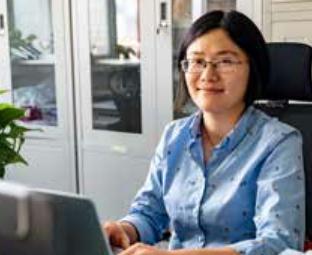Help Beyond Borders
2019-05-06byHuZhoumeng
by Hu Zhoumeng


Lin Yuan first visited Myanmar in July 2014. After being a member of the China Foundation for Poverty Alleviation (CFPA) for only a year, she was selected to participate in a 12-day overseas survey. In an interview with local college students, she met a girl who revealed that her father had passed away and her mother, who lost an arm, provided for the family and the girls education all by herself. The girl couldnt hold back tears while talking about her family. Lin was touched by the familys resilience. “I should do something in Myanmar,”she thought.
In March 2015, Lin went to Myanmar again for an internship with Mercy Corps and stayed to help set up the CFPAs Myanmar office. When she visited local governments and possible partner agencies, she found that Myanmars people were familiar with public welfare non-governmental organizations(NGOs) with the United Nations and from developed countries, but had seldom heard of Chinese NGOs. Lin was once asked how NGOs could operate in a country in which the government plays a dominant role in public affairs. She replied, “Although the Chinese government has a strong capacity, it also welcomes supplements from non-governmental forces. Now that the Chinese society is developing more comprehensively, you will see more Chinese NGOs working overseas.”
China-Myanmar Friendship
In the 2014 survey, Lin and her colleagues realized that education is one of the most urgent needs in Myanmar. Poor college students there need both financial support and capacity building. Therefore, the CFPAs Myanmar office launched its first public welfare project—the Paukphaw Scholarship Project—in July 2015, after it became the first Chinese international NGO registered in Myanmar. The project is a Myanmar version of the New Great Wall Self-Improvement Project that has been implemented in China for more than 10 years.
To investigate the background of scholarship candidates, Lin visited more than 40 villages and became the first foreign face to venture into many rural townships in Myanmar.“Because of a lack of electricity, many places had only dim light from solar lanterns at night and very little access to information.” But when she saw graduation photos of the students hanging on the walls at their homes, the parents always looked proud. “This is exactly the same as in China.”
In 2016, Lin and her colleagues decided to provide scholarships for 1,300 students from 12 universities in three states in Myanmar. They planned to support 700 of them for four consecutive years and the other 600 for one year, covering 70 to 80 percent of their living expenses. To achieve this goal, the CFPA would invest about 10 million yuan(US$1.5 million) in the four-year period starting from 2016. At the same time, Lins team also organized activities for the students, such as volunteer work, computer training and visits to Chinese enterprises. In 2017, the CFPA offered 10 Myanmar students a tour of Shanghai including visits to museums and pharmaceutical factories employing advanced technology. “We hope these students will pay the favor forward to others after receiving our help and also enhance their comprehensive competitiveness to get ready for graduation,” said Lin.
